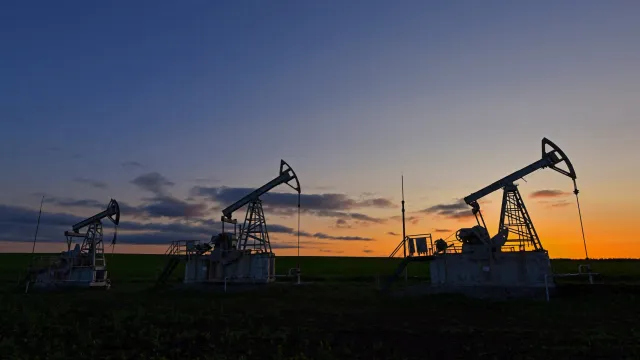
The UK has cited Russia’s power over global energy supply as a justification for expanding oil and gas drilling in the North Sea, but the plans may do little to dent Moscow’s fossil fuel exports.
Prime Minister Rishi Sunak has insisted that having new oil and gas licensing rounds for the North Sea was necessary to ensure energy security in the UK.
“We’ve seen over the last year the impact of [Vladimir] Putin’s war, we don’t want to be in hock to dictators like that when it comes to our energy and an important part of guarding against that is investing in our North Sea,” he said on Monday.
“We have all witnessed how Putin has manipulated and weaponised energy – disrupting supply and stalling growth in countries around the world.”
The invasion and subsequent Western sanctions heaped new pressures on oil and gas supplies that were already strained by the Covid-19 pandemic. European countries scrambled to find alternative supplies to make sure they could keep the lights on and their residents wouldn’t freeze in the winter.
While Russia’s gas exports took a serious hit, its oil continues to power a lot of global economies.
“There is a big difference between oil and natural gas, Russia is exporting as much oil as it can,” said Arild Moe, an expert on the Russian energy sector at Norway’s Fridtjof Nansen Institute.
The West imposed wide-ranging sanctions including an embargo on seaborne Russian oil imports but the country’s energy minister Nikolai Shulginov said earlier this year that Moscow had successfully redirected all its crude oil exports to “friendly” countries, particularly in Asia.
“The Western sanctions are not intended to stop or limit Russian oil exports but to reduce the Russian state’s income from oil exports,” Professor Moe told i.
“This has been achieved by introducing a price ceiling and by denying access of Russian oil to some markets, like the UK. But overall, the balance of supply and demand in the global oil market has been retained.”
While the UK is not dependent on Russian oil, increasing domestic supply could make Britain less vulnerable in case of disruptions to supply from any source, Professor Moe said.
But he added: “There is, however, no likelihood that Russia in the present situation would stop oil exports which is the backbone of the country’s economy.”
Unlike oil, which is bought on the international market, gas exported by pipeline is directed to particular countries. After Russia drastically reduced its deliveries of pipeline gas to European nations – its biggest gas export market before the war – it found new customers in the east, but it would take years to build the infrastructure needed to to supply them.
Russian gas continues to flow to Europe through pipelines running through Ukraine, mainly to Austria, Slovakia, Italy and Hungary, based on transit agreements signed in 2019 until the end of 2024, as well as through Turkey via the TurkStream pipeline.
In the first five months of 2023, Russian gas exports through pipelines amounted to 10 billion cubic metres (bcm), compared to 62 and 42 bcm in 2021 and 2022 respectively for the same period, according to analysis by the European Council on Foreign Relations.
Europe has “managed to pull through”, said Professor Moe, and so Russia lost its ability to use gas as a weapon.
“Britain stopped gas imports from Russia early on, mostly LNG [liquefied natural gas] – and Russia never was a big supplier of gas to the UK in any case,” he added.
“Increased domestic British production will not reduce dependence on Russia – since Russia is already gone as a supplier – but help balance supplies in the years ahead.”
Source: https://inews.co.uk/
